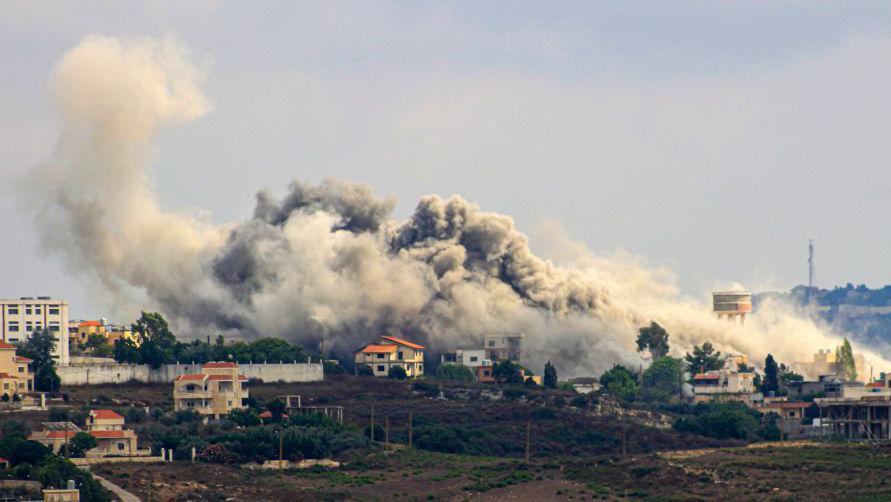Since October, there have been near-daily border attacks between Israel and Hezbollah, the powerful Iranian-backed militia and political movement in Lebanon, killing hundreds of people and forcing tens of thousands from their homes on both sides, raising fears that the relatively limited violence could escalate into a full-scale conflict.
Between the strikes and counterattacks, however, there are signs that they were trying to avoid a major confrontation. But misjudging was always a risk, and Saturday’s attack on the Druze town of Majdal Shams, in the Israeli-occupied Golan Heights, could have been one.
Israel has accused Hezbollah of carrying out an attack on a football field that killed at least 12 people, including children, in the deadliest attack in the current hostilities, and Israel has vowed to respond.
“Israel will not turn a blind eye to this murderous attack,” Israeli Prime Minister Benjamin Netanyahu said, according to a statement released by his office. “Hezbollah will pay a high price that it has not paid so far.”
Hezbollah denies being behind the attack.
Before the scale of the attack became clear, however, the group said it had struck the Hermon Brigade with an Iranian-made Falaq rocket, one of several attacks carried out that day. The base, on the slopes of Mt Hermon, is about 3 km (two miles) from where the explosion occurred, raising the possibility that the rocket missed its target.
Daniel Hagari, an Israeli military spokesman, said intelligence information indicated the attack was carried out by Hezbollah in Lebanon. He described the group’s denial as “a lie.”
US Secretary of State Antony Blinken also said that “all indications” pointed to the rocket being fired by Hezbollah, and that the US defended “Israel’s right to protect its citizens from terrorist attacks.”
So Lebanon is waiting for a possible major Israeli response.
Hezbollah’s attacks began on October 8, the day after a deadly Hamas attack on Israel, in which the group said it was supporting Palestinians in Gaza. More than 450 people have been killed in Lebanon so far, including about 350 Hezbollah fighters and at least 100 civilians. In Israel, 23 civilians and at least 17 soldiers have been killed.
In Lebanon, most of the Israeli attacks have hit the south, where villages have been destroyed and abandoned, and the eastern Bekaa Valley, two areas where Hezbollah is active. An Israeli campaign targeting places that have remained untouched so far, including parts of the capital Beirut, could lead to a dangerous and unpredictable phase in their fighting.
Hezbollah is seen as a far more formidable foe than Hamas and has been preparing for another major conflict with Israel since their last conflict in 2006, which has caused heavy damage to both sides. According to Western estimates, the group has around 150,000 rockets and missiles, which could overwhelm Israel’s advanced air defenses. Its arsenal also includes precision-guided missiles that can strike deep into Israeli territory.
Israeli authorities have repeatedly described the group’s attacks as unacceptable and have come under increasing pressure to take steps to allow displaced residents to return to northern communities. Military officials have said the Israel Defense Forces (IDF), which continues to conduct major operations against Hamas in Gaza, is ready to launch an offensive against Hezbollah, though details of what that might entail remain unclear.
Hassan Nasrallah, Hezbollah’s longtime leader, has repeatedly said the group does not want a full-scale war with Israel but is ready for one. Last month, he said the group had deployed only a fraction of its weapons and warned Israel that any war would be fought “without limits or rules.” A major operation against the group could lead to the involvement of other Iranian-backed militias in the region that make up what Tehran calls the “Axis of Resistance.”
Any war would be devastating for both countries, but especially Lebanon, which has been in permanent crisis for more than half a decade. The economy has collapsed, with an estimated 80% of the population living in poverty, and political disputes have blocked the election of a president for almost two years. The government has limited influence, if any, over Hezbollah, which, like Hamas, is considered a terrorist organisation by the UK, US and others.
But a full-scale war is not inevitable. Diplomats have tried to avoid a major escalation of hostilities, with Lebanon’s Foreign Minister Abdallah Bou Habib telling the BBC that authorities were “asking Hezbollah not to retaliate.”
Israeli Foreign Ministry spokesman Oren Marmorstein said the “only way” to avoid conflict was to implement United Nations Resolution 1701, which was passed to end the 2006 war. The text includes the withdrawal of armed groups from southern Lebanon, between the Litani River and the Blue Line, the unofficial border with Israel, but has never been fully implemented.
Now, Mr. Marmorstein said, it was “the very last moment” to prevent war diplomatically.

